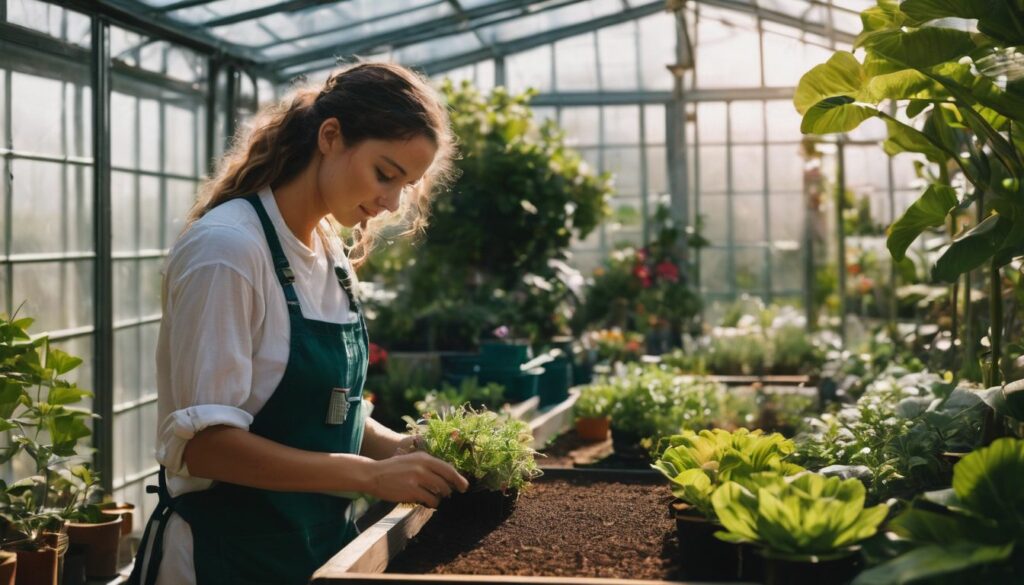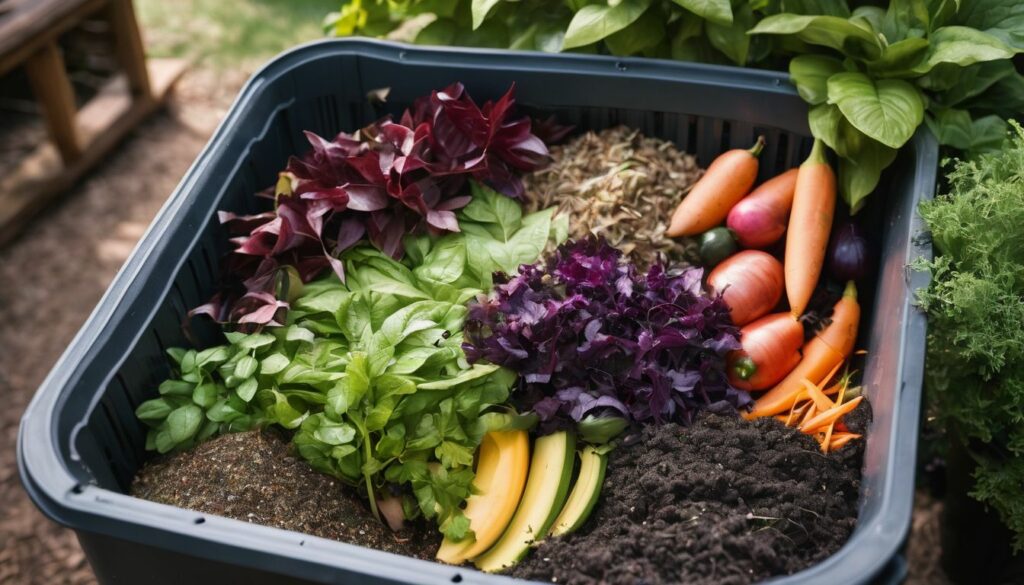Gardens can be a paradise, not just for us but for pesky insects, too. Many gardeners instinctively reach for chemical sprays to keep their leafy sanctuaries safe. But here’s the twist: nature has its own pest control department, and it doesn’t wear a hazmat suit.
I’ve spent years tending my own garden and teaching others sustainable farming practices without resorting to harmful toxins. Our health and the planet’s well-being hinge on organic solutions that work harmoniously with Mother Nature.
From garlic breath to chrysanthemum shields, our gardens can benefit from homemade recipes that are kind yet formidable against unwanted guests. This article peels back the layers of natural pest management, offering insights on how simple kitchen staples can safeguard your green kingdom effectively.
Keep reading because these DIY secrets will put you at the forefront of eco-friendly gardening mastery!
Key Takeaways
- Natural pest control uses items from your kitchen like garlic and hot peppers to stop garden pests.
- Homemade sprays with neem oil or chrysanthemum flowers can kill bugs without hurting the earth.
- Growing different plants together, called companion planting, helps keep pests away naturally.
- If bugs still get into your garden, there are ways to deal with them using things like ladybugs or soap water spray.
- It’s okay if your garden isn’t perfect; natural methods work better and keep our planet safe.
Understanding Pests and Their Impact on Gardens
Pests can wreak havoc on gardens, causing damage to plants and crops. Chemical pesticides may seem like a quick fix, but they pose risks to both human health and the environment. Understanding the different types of pests and their impact on gardens is crucial for finding effective natural pest control solutions.
Types of pests
Gardens attract many different bugs and insects. Some chew on leaves while others suck plant juices. Aphids, caterpillars, slugs, and beetles are common pests in many gardens. They can hurt vegetables and flowers by eating them or laying eggs.
Natural pest control methods can help fight these unwanted visitors. Sprays made from kitchen ingredients stop these critters without harming the earth. Organic gardening lovers use homemade solutions instead of chemicals to keep their plants safe.
This way, they avoid adding toxic substances to their gardens.
Risks of using chemical pesticides
Chemical pesticides pose a threat to the environment and human health. Harmful residues can remain on vegetables, fruits, and in the soil, affecting the overall ecosystem. Additionally, they can harm beneficial insects vital for natural pest control, disrupting the delicate balance of biodiversity necessary for a healthy garden.
Using chemical pesticides may lead to pesticide resistance in pests over time. This means that pests become less susceptible to chemical treatments, making it harder to manage infestations effectively.
Furthermore, repeated exposure to these chemicals may result in long-term detrimental effects on soil quality and plant health.
Homemade Organic Pest Control Solutions
Discover natural and homemade solutions for controlling pests in your garden, including spicy Tabasco spray, garlic and onion-based spray, tobacco juice spray, eucalyptus and detergent spray, neem-oil based spray, and chrysanthemum flower insecticide.
These eco-friendly alternatives to chemical pesticides are safe for the environment and promote a healthy garden ecosystem.
Spicy Tabasco Spray
Spice up your pest control with a homemade Spicy Tabasco Spray! This powerful concoction made from hot peppers and water is an effective deterrent against common garden pests like caterpillars, aphids, and beetles.
The capsaicin in the peppers acts as a natural repellent for insects, making it an eco-friendly solution that won’t harm beneficial bugs or contaminate your produce. Plus, it’s easy to make at home using Tabasco sauce or fresh hot peppers, giving you a sustainable and nontoxic way to protect your garden.
Ready to clear out those pesky pests? Before reaching for chemical pesticides, consider whipping up some Spicy Tabasco Spray. It’s a simple yet potent tool that can help safeguard your plants without compromising the health of your garden or the environment.
Garlic and Onion-Based Spray
Moving from the spicy Tabasco spray, another effective homemade organic pest control solution is the garlic and onion-based spray. This potent insect repellent can be made by blending fresh garlic cloves and onions with water to create a concentrated liquid that deters pests effectively.
These pungent ingredients not only repel insects but also have antifungal properties, contributing to plant health while deterring unwanted pests naturally. When sprayed on plants, the strong odor acts as an efficient deterrent against common garden pests like aphids, caterpillars, and mites without harming beneficial insects or plants.
Ecofriendly pest control methods are gaining popularity among homesteaders for protecting their gardens sustainably. Utilizing a garlic and onion-based spray aligns with the goal of maintaining an environmentally friendly approach to gardening while ensuring healthy produce through natural pest management solutions.
Tobacco Juice Spray
Make a natural pest deterrent using tobacco juice. Mix cigarette or cigar butts in water and leave for 24 hours, then strain. Add liquid soap to help the spray stick to plants. This organic solution keeps pests away without toxic chemicals.
The tobacco juice spray is an effective homemade remedy that deters garden pests like aphids and caterpillars. It’s a simple, eco-friendly way to protect your garden from harmful insects while avoiding harsh chemical pesticides.
Eucalyptus and Detergent Spray
After exploring the uses of tobacco juice spray, another effective natural pest control solution for homesteaders is the eucalyptus and detergent spray. This combination acts as a potent insect repellent, particularly against aphids and whiteflies in the garden.
Eucalyptus essential oil contains compounds that deter pests, while adding detergent helps in distributing the oil evenly and increasing its effectiveness as an insecticide.
When preparing this homemade organic pesticide recipe, combine 2 cups of water with 2 teaspoons of eucalyptus essential oil and a few drops of mild liquid dish soap. Mix thoroughly and pour it into a spray bottle.
Neem-Oil Based Spray
The neem-oil based spray is an effective natural pest control method for gardens. Neem oil, derived from the seeds of the neem tree, acts as a repellent and disrupts the feeding and reproduction of many pests, including aphids, mealybugs, and spider mites.
It also serves as a deterrent to prevent insects from laying eggs on plants. This organic insecticide can be easily made at home by mixing neem oil with water and mild liquid soap, creating an eco-friendly solution that helps protect plants without harming beneficial insects or the environment.
By utilizing this nontoxic pest control method, homesteaders can effectively manage garden pests while preserving a healthy ecosystem.
Chrysanthemum Flower Insecticide
Chrysanthemum flowers contain a natural insecticide called pyrethrum, which effectively repels and kills garden pests. Pyrethrins, derived from chrysanthemum flowers, are widely used in organic gardening to control insects like aphids, beetles, and fleas.
This eco-friendly solution is low in toxicity to humans and animals but highly effective against a wide range of pests. Applying chrysanthemum flower insecticide can help homesteaders maintain an environmentally friendly approach to pest control while preserving the health of their gardens.
By incorporating chrysanthemum flower insecticide into their pest control strategy, homesteaders can harness the power of this natural remedy to protect their plants without resorting to harmful chemicals or toxins.
Preventing Pests in the Garden
Maintaining plant health, improving soil quality, utilizing diversity and polyculture, choosing pest-resistant plants, companion planting, proper garden maintenance and crop rotation, diligence in monitoring and early intervention, as well as using physical barriers and targeted treatments are all effective ways to prevent pests in your garden.
Maintaining plant health
To maintain plant health, focus on building healthy soil through natural composting methods free from chemicals. Encouraging the growth of beneficial microorganisms in the soil helps plants resist pests and diseases.
Rotate crops regularly to prevent pest buildup and reduce the risk of infestations while promoting diversity in your garden’s ecosystem. Additionally, choose resistant plant varieties suited for your region, minimizing vulnerability to common pests.
Keep garden beds weed-free to eliminate hiding spots for pests, creating a less hospitable environment for them. Lastly, ensure appropriate watering practices to avoid stress on plants and promote strong root systems that can better withstand pest attacks.
Improving soil quality
Improve soil quality by adding organic matter like compost and aged manure to the garden. This helps enrich the soil, promote healthy plant growth and resilience against pests. Utilize natural methods such as crop rotation and cover cropping to maintain soil fertility and keep pests at bay.
By fostering nutrient-rich, well-draining soil, you create an environment where plants can naturally defend themselves against pests while supporting a thriving ecosystem in your garden.
Additionally, ensure that your choice of pesticide is free from toxic chemicals to safeguard the balance of the garden’s ecosystem. Choose natural pest control methods that align with environmentally friendly practices to uphold a healthy garden for both plants and beneficial insects alike.
Utilizing diversity and polyculture
Diversifying plant types in the garden helps deter pests naturally. Planting a mix of vegetables, herbs, and flowers can confuse pests and make it harder for them to find their favorite food sources.
This can also attract beneficial insects that help keep pest populations in check. Additionally, polyculture – planting different crops together – helps create a balanced ecosystem that reduces the likelihood of pest infestations and enhances overall resilience against potential outbreaks.
Encouraging diversity within your garden not only creates a visually appealing space but also plays an important role in keeping pests at bay. By integrating this approach into your gardening practices, you promote a healthy environment that supports natural pest control while enhancing the productivity of your garden.
Choosing pest-resistant plants
Selecting pest-resistant plants is crucial in maintaining a healthy garden without relying on chemical pesticides. Look for plant varieties known for their natural ability to repel or withstand pests, such as marigolds, basil, and lavender.
These plants not only deter pests but also attract beneficial insects that help control unwanted bugs in the garden. By incorporating pest-resistant plants into your garden, you can create a natural barrier against common pests while promoting an eco-friendly and sustainable gardening environment.
Companion planting
Companion planting is a smart way to naturally prevent pests in the garden. By strategically placing plants together, you can deter harmful insects and attract beneficial ones. For example, planting marigolds alongside vegetables can repel nematodes and other destructive pests due to their strong scent, while also attracting pollinators such as bees and butterflies.
Additionally, growing basil next to tomatoes can help improve the flavor of the tomatoes and keep pests like aphids away. Gardeners can use companion planting to create a natural ecosystem that supports plant health and discourages pest infestations without relying on chemical pesticides, contributing to a more sustainable and eco-friendly garden.
Incorporating companion planting not only helps with pest control but also enhances biodiversity in the garden. This approach fosters a balanced environment where different plants work together for mutual benefit, promoting resilient ecosystems that are less prone to pest outbreaks while reducing reliance on chemical interventions for maintaining healthy gardens.
Proper garden maintenance and crop rotation
To maintain a healthy garden, proper garden maintenance is crucial. Regularly inspect plants for signs of pest infestation and disease to intervene early. Clean up garden debris like fallen leaves and rotten fruits which can harbor pests.
Maintain good air circulation around plants to discourage fungal diseases using proper spacing. Rotate crops annually to interrupt the life cycles of pests and prevent the buildup of soil-borne diseases.
Inspect your garden frequently for any signs of trouble.
Diligence in monitoring and early intervention
Regularly inspect plants for signs of pests such as holes in leaves, chewed stems, or wilting. Keep an eye out for aphids, caterpillars, and other common garden pests. Act promptly to address any pest infestations before they escalate and cause significant damage to the garden.
Utilize natural methods like hand-picking insects off plants and introducing beneficial predators to maintain a balanced ecosystem in the garden. Implementing these proactive measures can effectively minimize the impact of pests on your crops while promoting a healthier and more sustainable gardening environment without relying on chemical solutions.
Physical barriers and targeted treatments
To complement diligence in monitoring and early intervention, physical barriers such as row covers, netting, and fences serve as effective defenses against a variety of garden pests.
These barriers act as protective shields, preventing insects and larger animals from accessing the plants while allowing sunlight and water to nourish crops. Additionally, targeted treatments like diatomaceous earth and sticky traps are simple yet powerful methods for controlling specific pests without harming beneficial insects or introducing chemicals into the environment.
By incorporating these physical barriers and targeted treatments into your natural pest control strategy, you can foster a thriving garden ecosystem while safeguarding your plants from potential threats.
What to Do When Pest Prevention Fails
When all your efforts to prevent pests in the garden fail, it’s important to have natural solutions ready for specific pests. Embracing imperfections and accepting that a “perfect” garden may not be achievable is essential for maintaining a healthy and productive garden.
Natural solutions for specific pests
Garden pests can be effectively managed with natural solutions. Here are some simple and eco-friendly remedies for specific pests:
- Aphids: Introduce ladybugs to the garden, as they are natural predators of aphids, or spray plants with a mild soap and water solution.
- Slugs and Snails: Use crushed eggshells or diatomaceous earth around plants to create a barrier that deters these pests.
- Caterpillars: Plant dill, fennel, or parsley to attract parasitic wasps that prey on caterpillars, or handpick caterpillars off plants early in the morning.
- Beetles: Apply neem oil spray to repel beetles while being safe for beneficial insects like bees.
- Mites: Release predatory mites onto affected plants to feed on plant-damaging mites without harming other organisms in the garden.
- Ants: Sprinkle powdered cinnamon at entry points to deter ants from accessing plants or use citrus peels as a natural ant repellent.
- Weevils: Interplant beans with summer savory, a natural weevil deterrent, or employ beneficial nematodes to target weevil larvae in the soil.
- Whiteflies: Hang yellow sticky traps near affected plants to capture adult whiteflies or introduce natural enemies like Encarsia formosa parasitic wasps.
- Mosquitoes: Grow mosquito-repelling plants such as citronella, lavender, and marigolds in the garden to naturally discourage mosquitoes from breeding nearby.
- Rodents: Utilize physical barriers like wire mesh cloches and fences around vulnerable crops or employ owl decoys to scare away rodents from the garden area.
Importance of acceptance and not striving for a “perfect” garden
Acceptance of imperfection in the garden is crucial for natural pest control. Embracing minor blemishes on plants and understanding that a flawless garden may not be feasible encourages the balance of biodiversity, beneficial insects, and natural processes essential for a healthy ecosystem.
By accepting this reality, homesteaders can focus on sustainable management rather than pursuit of perfection.
Striving for an ideal garden often leads to unnecessary use of chemical pesticides. Recognizing that achieving perfection may require harmful interventions helps homesteaders shift their mindset towards embracing natural pest deterrents and organic remedies provided by the environment itself.
Conclusion
In conclusion, natural pest control offers effective and practical solutions for homesteaders. These homemade remedies are easy to implement and provide efficient ways to protect gardens from pests without harsh chemicals.
Emphasizing the importance of these strategies, their potential impact includes significant improvements in garden health and productivity. For further guidance, readers can explore additional resources available for continued learning and engagement beyond this article.
Take action today towards maintaining a healthy garden with eco-friendly pest control methods that are both impactful and sustainable.
FAQs
1. What is effective natural pest control for homesteaders?
Effective natural pest control for homesteaders involves using homemade solutions and organic methods to keep your garden healthy without harmful chemicals.
2. Can I make my own insect repellent for the garden?
Yes, you can create DIY organic pest control sprays using ingredients like essential oils or spicy peppers to stop bugs from damaging your plants.
3. Are homemade pest remedies better than chemical ones?
Homemade pest remedies are ecofriendly alternatives that can be just as effective as chemical products but are safer for the environment and your family.
4. What are some natural ways to protect my garden from pests?
You can use natural insect repellents like neem oil, introduce beneficial insects, or plant herbs that pests do not like around your vegetables and flowers.
5. How do I manage pests in my garden organically?
To manage pests organically, try DIY homemade solutions such as soap sprays or garlic mixtures; they deter unwanted insects without harming beneficial ones or the soil.





